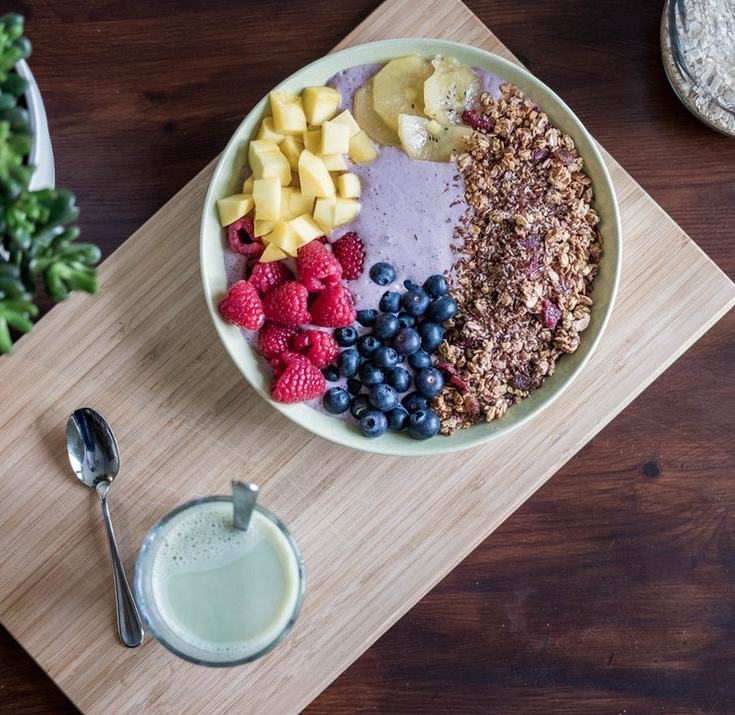One of the largest problems young women face today is skewed body image. I have never met a young girl that describes their body as “strong” or “spectacular.” Instead they tend to focus on their perceived flaws, such as “no thigh gap” or “huge stomach.” Pressure to look and act a certain way is largely presented via social media, which gives us unrealistic ideals to strive for, and most of this pressure falls on those women who are already struggling with their self-image and mental health. All of my friends in middle school and high school always focused on what they should be eating and how this could help make them look “better,” and it affected me to a degree that I would never have expected. I fell into a trap of deep negativity, and began to view who I was as a person through the lens of what I looked like as a woman. What this image-focused behavior leads to, in many women and young girls, is disordered eating.
As someone who has always struggled with body image, I had a horrible relationship with food. Not only did I view food as “harmful” or “evil,” but I also gave up foods I truly enjoyed in favor of trying to achieve a body type not suited for my health and well-being. Long story short, I developed an eating disorder, fighting my own instincts and negatively reshaping my self-image. Thankfully, I worked my way through my experience with anorexia, but my perception of food was still completely distorted. During my recovery, I worked with a dietician and searching for ways to rid of my unhealthy image of food, and she recommended the book Intuitive Eating by Evelyn Tribole. At this point in my life, I had tried so many ways to revamp my diet, and practically nothing worked for me, or even helped me see food in a better light. When she suggested this book, I kind of laughed and thought, a book? Really? How is a book about eating going to be any different than what I have already tried? You might be as skeptical as I was, but this term holds more value than meets the eye.
Intuitive eating centers around the idea of focusing on hunger cues that your body provides every couple of hours during the day, instead of counting calories and tracking exercise in hopes of losing weight. In practicing this type of eating, where you are focusing on what your body actually wants, you satisfy your cravings and keep your body healthy and happy. This type of eating specifically targets those who experience “diet backlash,” which occurs when chronic dieting has led to an unhealthy relationship with food intake and perception. Rather than putting the main focus on tracking foods, eating intuitively involves listening to your body, which shifts the focus of eating into a more positive light.
Here are some of the reasons I follow this form of eating, and why you should look into it, too:
1. It helps you stay away from potentially harmful and useless diet fads.
A lot of the diets promoted by the media in today’s world are ridiculous, and some are outright dangerous. Though it might be necessary for some people to avoid gluten or dairy-based products because of health issues, most food groups – carbs, dairy, fats – are not as inherently harmful as people make them out to be. Utilizing intuitive eating helps to steer people away from the “restricting” mentality most take up while trying to fix their diet. Focusing on what your body wants, rather than upsetting yourself in restricting your eating habits, is best providing physical and mental health.
2. Intuitive eating shifts the focus from emotional eating to eating for health and hunger.
People often eat in response to emotion. Whether you are celebrating your birthday and eating a piece of cake, or your relationship ended and you are drowning your sorrows in ice cream and cake (what a great combination to forget about that jerk, right?) emotions subconsciously control the way we perceive our food, as well as what we desire in the moment. Neurologically, emotional eating is positively correlated to food-cues within the insular cortex of the brain. The insular cortex is located behind your frontal cortex, and it is known to control emotional responses, including food preferences and cues. When our emotions are heightened – for example, when we’re nervous about an exam or upset about a bad score we got on a test, we are more inclined to lean on food than other methods of coping.
Intuitive eating focuses on feelings of hunger we have throughout the day, which can vary from person to person. In doing this, you have to ask yourself if you are actually hungry before you grab a tub of ice cream or go out for food. In becoming more conscious about my hunger, I am more aware of the fact that I sometimes when I think I want to eat, it’s just because I’m bored. This is a great way to make yourself think in the present and focus on what you really need, instead of feeding your emotions.
3. Respecting your body is much easier to do when you focus on your health, rather than constantly focusing on weight or body image.
When I used to try dieting and exercising to lose weight, I put way too much focus on losing the weight I didn’t need to lose. I always perceived my body in a negative light, and I wanted to achieve something that was physically impossible for me. Studies show that more than 90% of girls aged 15 to 17 years old want to change at least one aspect of their physical appearance, with body weight ranking the highest . This is not only greatly concerning for the youth of today’s society, since lack of confidence leads to depression and low self-esteem, but it also indicates a very serious problem faced by young women in the United States, as well as worldwide. Women are socially pressured to act and look a certain a way, which causes them to develop the mindset I used to rely on. Intuitive eating has shifted my attention away from the mentality of “eating to lose weight” to “eating for my health and well-being.” Bashing our self-appearance for something we can’t change, especially when it comes to genetics and body composition, is a waste of our time. Appreciating how strong our bodies are should be our number one priority, and this form of eating has helped me to do just that.
Though many people use this as a way to healthily lose weight, this philosophy of eating is also a method that can be applied in promoting balanced eating and a healthy perception of all foods – not just the ones we avoid. It provides both flexibility and relaxed principles to follow, which focus on positively helping those who struggle with the composition of food in relation to seeing one’s body. If you are craving a cookie, have the cookie! It won’t kill you! This form of eating lifted me out of my funk, and it helped me to listen to my body so I could give myself what I needed.
Francesca Cocchiarale

